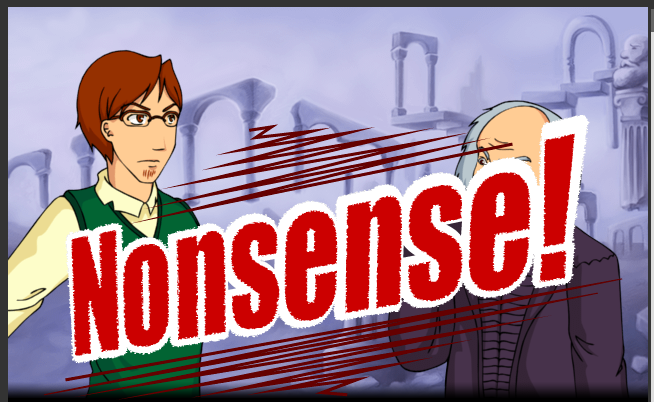I couldn’t help but be charmed by Socrates Jones: Pro Philosopher, an in-browser game where you argue philosophy with a hit parade of great thinkers. (That’s Thomas Hobbes being rebutted by the protagonist above). You, Socrates Jones, are trapped in a kind of limbo for philosophers, and you can only escape if you give the Arbiter an answer to the question of Morality.
There’s plenty of room to be frustrated with nuances of the philosophies being left out, or with philosophers being omitted (Euthyphro’s is the only theistic argument), but on the whole it’s a fun game. I’ll admit to not quite being over my deontologic past and cheering Kant on against my character when they came to blows. If you get stalled out somewhere, you can cheat off of this walkthough, to see how the game intends you to play.
The four tools you-as-player have are “Ask for Clarification” “Question Relevance” “Press for Backing” and “Challenge!” (which involves bringing up a counterpoint — usually a premise that has already shown up in the philosopher’s argument. And this was particularly fun for me to discover, since I’ve been engaged in debate design over at my day job.
We wanted to make the debate participatory, but we didn’t want the audience in an antagonistic frame of mind, so we didn’t want them to just play “Spot the Fallacy.” We wanted to give people the opportunity practicing directing a disagreement in useful directions, not just sniping an opponent, so we came up for ways for them to signal things like “Give an Example/Be Specific!” “Relevance/Tangent?” and “Paraphrase your Opponent” and I was pleased to see the overlap in the game. (Our debate is this Thurday, if you’re in the Bay Area).
What I liked best about the Socrates Jones game (and it sure wasn’t the answer) was the assumption that the philosophers answers ought to be intelligible to the accountant protagonist. You couldn’t lose points asking for clarifications, and the player-character several times emphasized that, especially as the question was about morality, he had to be able to understand it, to be able to live it out. (Which I think indicated that he should have listened more to Kant, who would have agreed it was necessary he be able to will the good to be good, not just be directed by some arcane rule to good consequences).
Oh, and the game was fun for me for one probably-unique reason. On my last visit to DC, my role as Big Bad in my boyfriend’s DnD game (this one) came to a close. I had been playing the last true disciple of the interrogator-god, described as follows:
Astermeid’s followers believe in rhetorical confrontation as almost the highest good, and also subscribe to a very Darwinist outlook with respect to others. Those who lose arguments or cannot give satisfactory answers to questions are, according to the Church of Astermeid, the most pathetic of all life and do not deserve to even have the dignity of justice.
My character had been trying to prepare an apologia for existence for her god, but unlike Socrates Jones, who got to answer questions in peace, she had to deal with pesky adventures who found a Talisman of Pure Good and managed to cast her/me into a fiery rift. Alas. We did at least get a picture of the death scene (which followed a Hannibal Lecture).














